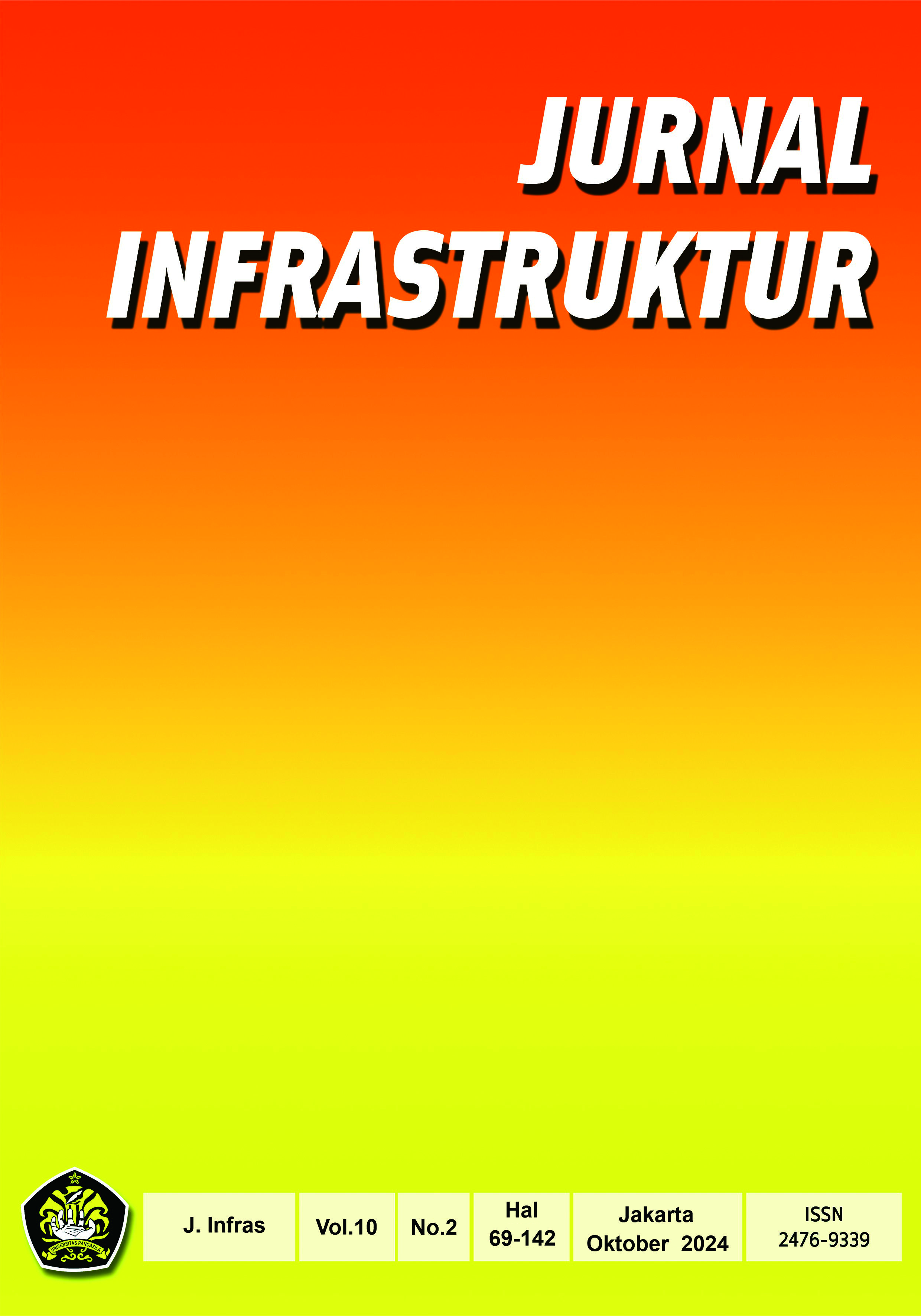ASSESSMENT OF PEDESTRIAN PERCEPTION TOWARDS THE FUNCTION OF SIDEWALK SERVICES IN MAJENE REGENCY
Case Study: DR. Ratulangi, AP Pettarani and Gatot Subroto Street Banggae subdistrict
DOI:
https://doi.org/10.35814/infrastruktur.v10i2.7415Keywords:
Sidewalk, Pedestrian, Perception, Service, Comfort, Safety, ConnectivityAbstract
Walking is the simplest form of transportation and can be used by everyone. The decline in the desire to walk is associated with the reduced service functionality of sidewalk infrastructure. This study examines pedestrian perceptions regarding the service functionality of sidewalks on DR. Ratulangi, AP. Pettarani, and Gatot Subroto streets in Banggae Subdistrict, Majene Regency. The perception assessment study uses a qualitative and quantitative descriptive statistical approach, referring to the Ministry of Public Works and Housing Regulation No. 03-2014, which provides guidelines for planning, providing, and utilizing infrastructure and pedestrian network facilities in urban areas. The analysis results indicate that the use of sidewalks is mainly driven by considerations of time and safety while walking. Respondent perceptions show that the aspects of comfort, safety, and connectivity on the streets studied fall under the "fairly good" criteria. Based on the existing perceptions, respondents expressed a desire for improvements and enhancements in these variables, which are expected to increase both interest and the need for walking using sidewalk facilities.
References
Aryatoni, F. (2008). Partisipasi masyarakat dalam perencanaan wilayah: Kasus partisipasi masyarakat dalam perencanaan tata ruang Sarilamak sebagai ibu kota Kabupaten Lima Puluh Kota [Universitas Gadjah Mada]. https://etd.repository.ugm.ac.id/home/detail_pencarian/39504
Counting steps via smartphones reveals intriguing clues about obesity | Stanford Report. (n.d.). Retrieved July 7, 2024, from https://news.stanford.edu/stories/2017/07/stanford-researchers-find-intriguing-clues-obesity-counting-steps-via-smartphones
ITDP Indonesia. (2019). Panduan Desain Fasilitas Pejalan Kaki: DKI Jakarta 2017-2022. 2019(September 2019), 2731.
Kementerian Pekerjaan Umum Dan Perumahan Rakyat. (2023). Pedoman Bidang Lingkungan dan Keselamatan Jalan No. 07/ P/ BM/ 2023 tentang Perencanaan Teknis Fasilitas Pejalan Kaki. 07, 1–84.
Kidies, G. D. (2019). TINGKAT KEPUASAN PEJALAN KAKI TERHADAP FASILITAS JALUR PEJALAN KAKI (STUDI KASUS : JALAN MALIOBORO).
Malhotra, N. K. (2006) Riset Pemasaran Pendekatan Terapan. Edisi 4 Jilid 1.
Muhidin, S. A. (2007). Analisis korelasi regresi dan jalur dalam penelitian:Dilengkapi aplikasi program SPSS.
Pejalan kaki - Wikipedia bahasa Indonesia, ensiklopedia bebas. (n.d.). Retrieved August 7, 2024, from https://id.wikipedia.org/wiki/Pejalan_kaki
Permen PUPR No. 03/PRT/M/2014 Tahun 2014. (n.d.). Retrieved August 28, 2024, from https://peraturan.bpk.go.id/Details/128205/permen-pupr-no-03prtm2014-tahun-2014
Sitanggang, Y., As, S., & Kadarini, S. N. (2018). Pengaruh Pedagang Kaki Lima terhadap Kenyamanan Pejalan Kaki Dalam Pemanfaatan Trotoar (Studi Kasus Jalan Jendral Urip Pontianak). JeLAST, 5(1), 2–15.
Topurtawy, F. G., Pinoa, W. S., & Sihasale, D. A. (2023). Tinjauan Alihfungsi Trotoar Di Jalan Pantai Mardika Kecamatan Sirimau Untuk Lokasi Pedagang Kaki Lima. Jurnal Pendidikan Geografi Unpatti, 2(3), 234-243–234–243. https://doi.org/10.30598/JPGUVOL2ISS3PP234














